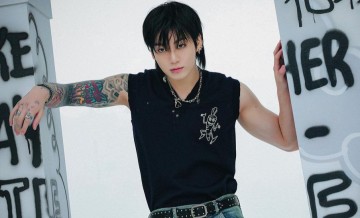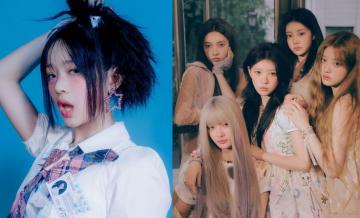All About K-Pop: Expert Panel Discusses The Past, Present And Future Of Korean Music
On Wednesday, May 22 the Korea Society in New York City held a panel discussion about the past, present, and future of K-Pop and the genre's place in the world.
The panel included several influential people in the world of Korean entertainment media like Billboard's resident K-Pop expert Jeff Benjamin and K-Pop blog co-founder Johnny Noh. Christina Love Lee, the fourth place finisher on SuperStarK 3, and K-Pop Star 2 contestant Nicole Curry also sat in on the discussion to give an insider perspective on the Korean music industry. The panel was moderated by well-known columnist and writer Jeff Yang and featured a discussion of K-Pop's world-wide popularity and a question and answer segment with the audience.
Jeff Yang started out the event by explaining why they were all brought together for the night; to discuss the momentum Korean artists have in spreading their music across the globe. He noted K-Pop is expanding quickly "because of its bizarre international popularity."
"K-Pop transcends boundaries, culturally and otherwise," said Yang.
All of the panelists agreed that the internet was crucial in this aspect. "Korean entertainment companies really utilize YouTube," explained Johnny Noh. "this opens their music up to other audiences." Jeff Benjamin reiterated this idea by calling YouTube "the gateway to the world," and referred to popular Korean music as a "delicious pop package that appeals to a lot of people around the world."
Recounting an anecdote about JYP Entertainment's founder and CEO, Jin Young Park, Yang expanded on the notion that the internet is a fundamental part of K-Pop. Upon meeting the influential JYP nearly a decade ago, the record executive introduced himself by saying, "I'm from the future," a line that at the time was a bit strange, but as things have played out, has proven to be incredibly true. At the time JYP knew that digital music downloads and promoting singers via the internet was the wave of the future, also noting, "people only by discs as a souvenir."
The discussion soon turned to, as Yang put it, "creating a master brand for K-Pop." The panelists explored the creation of idols from the training process to debut and the expansion and evolution of their brand.
The brand extends beyond just the music itself and into the entire idol image package. There is a standard template many Korean entertainment companies use, sort of "star factories" explained Yang, but as K-Pop continues to spread, even that idea is changing.
Christina Love Lee and Nicole Curry are fantastic examples of this idea.
Lee mentioned that their experiences on audition shows gave them the opportunity to "leap over the training process" even if they did not fit the mold of a typical K-pop idol.
"I didn't feel comfortable with the package that comes along with being a K-Pop star," said Lee. She explained that while on SuperStarK she felt pressure to fit a certain mold. "I felt it severely. I don't look like all the popular female artists. But after I kept making it through each round, I thought 'maybe I can be a K-Pop star?'"
Nicole Curry's experience was equally jarring. "I was really foreign. Like, really foreign," she laughed. She remembers thinking everyone else was training really hard and that eventually she fell into the groove of things.
Whether a K-Pop singer went through the traditional training process or appeared on an audition show, "the notions of struggle and survival is imprinted in the brand," said Yang. He referred to artists as having something similar to "blue-collar success." They work hard to perfect their brand and even harder to maintain it. "The music is just a way to get the artists popular," Yang said. After that, the panel agreed, they become the whole entertainment package with TV appearances, movies, endorsement deals, and more.
In the end, however, the panel seemed to agree on one main idea: K-Pop as a genre and as a consumer brand has definite staying power. Especially for an American audience, K-Pop is something fresh and new, and thanks to the internet, it looks like it will continue to spread for the foreseeable future.
















